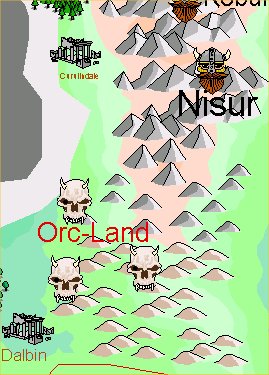 The southern foot-hills of the Erean Mountains were originally part of the Elven realm of Sildor, but after the disaster at Thallan in 672, the Elves withdrew into their homeland and abandoned the hills.
The southern foot-hills of the Erean Mountains were originally part of the Elven realm of Sildor, but after the disaster at Thallan in 672, the Elves withdrew into their homeland and abandoned the hills.Eight hundred years later, Varkar Barduric systematically attacked, broke and destroyed the great and ancient orc-fortresses in the northern mountains, and the Erlyid Emperor Titus III found he had nearly the entire surviving Orc people gathered on his northern borders. Aware that, battered as they were, the orcs could pose a serious problem, he took a controversial step, and negotiated an alliance with the refugee clans, accepting their fealty in return for permission to settle in the hills. The orcs, always inclined to follow the strongest leader, saw in the Erlyid a powerful master who could protect them from their enemies; Titus saw that - with time - the orcs could bring new strength to the Erlyid military, as well as forming a buffer between the Empire and the Dragon.
At this pivotal moment, an ambitious half-orc, Garkaur Kūlataur, formerly of Kishshul, seized the initiative and forced the clan-chiefs to allow him to open negotiations with the Erlyid. Much to everyone's surprise, Garkaur and Emperor Titus III managed to reach an agreement. The Erlyid gave the orc people the lands north of the Empire and south of Nisur for their own (they named it Orcland with typical originality); the orcs elected Garkaur their Overking - the first since Gījark Mūprlūr more than fourteen hundred years before - and swore alliance with the Empire.
Titus was right, but the price was heavy; the elves and dwarves both broke off formal relations with the Empire, and the province of Nhased seceded a few years later. When the Empire sent legions - including orc troops - in to squash the revolt, the elves, dwarves and Stryrans all sent troops to support the Theocracy, and the Empire was forced to retreat.
The few surviving elves, waiting in Belegond for the inevitable next attack, and the dwarves, reacted in fury, condemming the Empire and withdrawing their ambassadors. When Nhased seceded from the Empire eight years later, neither the elves nor the dwarves would support their former allies, sending troops to aid the Theocracy instead, and the Empire lost the resulting war.
Orcland remained a client-state of the Empire, and a few exceptional orcs and half-orcs rose quite high in Imperial society. The Imperial military also maintained a few Orc units - none bigger than cohort size - although they were generally regarded as primarily expendable shock troops.
The treaty prevented them from wholesale raiding and pillaging but occasional forays against the dwarves, Nhased and dragonfolk were quietly ignored. Since that day, the Overking of Orcland was always known as Garkaur Kūlataur, presumably in honour of the first Overking who forged the alliance.
All this came undone in 1602, when Sack unmasked the then Garkaur as a half-orc-elf who was in fact the original Garkaur, revealed him as the instigator of a near-war between Skufruss and Belamir, and executed him. The Orc homeland promptly disintegrated into civil war and chaos, with three major forces vying for control:
Maurźnd the Uncanny, clan-lord Ghįkhoz, Thend the Wizard, Ramphag Thunderslayer and Shumash Death Tongue travelled north, intending to cross the mountains and reclaim the ancient fortresses.
Lorgloth Blue Knife, clan-lord Ragorka, siezed control of Dun Tolk, and although having fewer warriors than Headbreaker, managed to hold his foe to a stalemate.
Amraz Headbreaker, clan-lord Grakhyol, controlling the larger share of the orcs that did not follow Maurend and the others, encamped in some ruins for the winter, plotting how to prise Blue Knife out of Dun Tolk.
At this critical point, Sack and Hildraft intervened, hammering the orc people into some semblance of unity and arranging their mass transportation across the Ereans and home to Kishshul. Orc-Land was left virtually abandoned, except for a few orc tribes too bloody-minded to accept Sack's offer, until the Empire annexed it in the early years of Crixus's reign